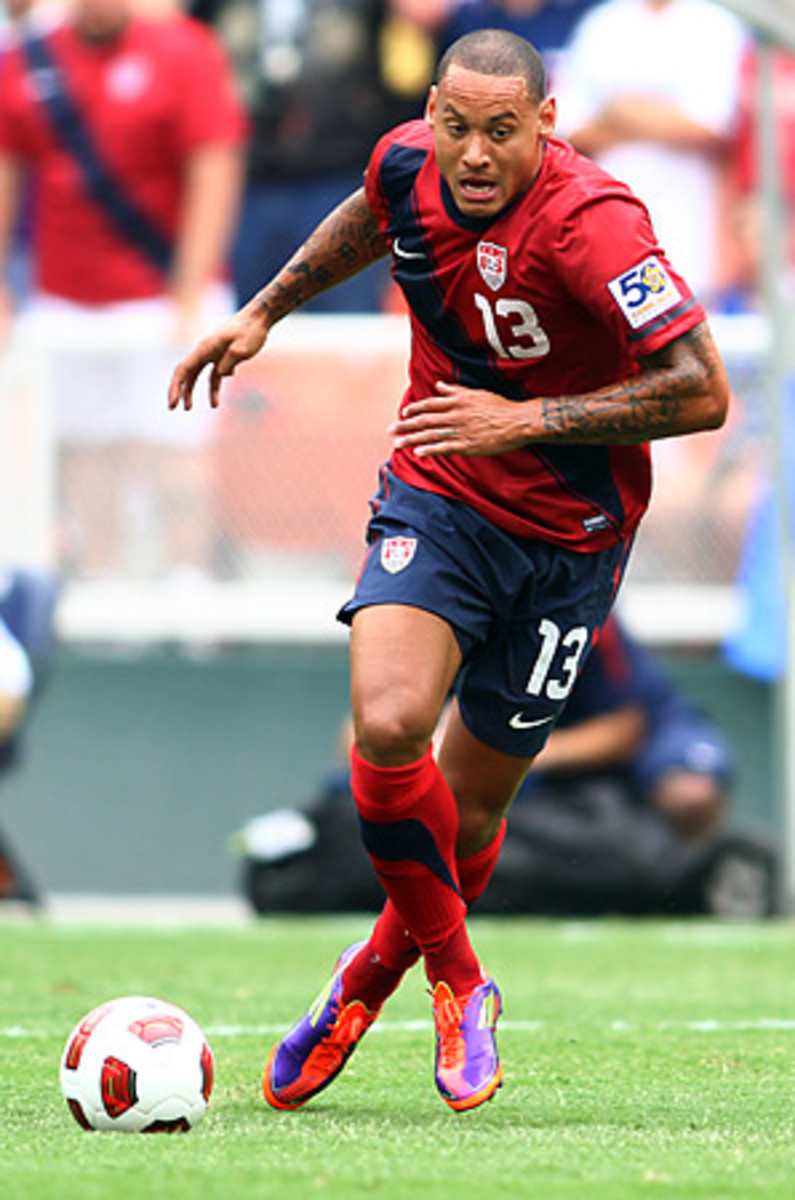
Five storylines to follow entering U.S.-Panama semifinal clash
HOUSTON -- Five things on my mind as we get ready for the Gold Cup semifinals on Wednesday between the U.S. and Panama (7 p.m. ET, Fox Soccer, Univisión) and Mexico and Honduras (10 p.m. ET, same channels):
• Will the U.S. go with five midfielders again? We'll probably see a few changes in the U.S. lineup that was upset by Panama 2-1 in the group stage, but the big question is whether the Yanks will go with the five-man midfield that was so successful against Jamaica in the quarterfinals. That decision came as a major surprise -- including to the Jamaicans, who were outmanned in the midfield -- after it looked as though the U.S. would play 4-4-2 for the entire tournament. I'm expecting the U.S. will stick with the 4-2-3-1 in this game. With Jozy Altidore sitting out due to a hamstring injury, the likely lone U.S. forward will be Juan Agudelo (or Chris Wondolowski), who both may be better-suited as lone front-runners than Altidore. Here's the lineup I think we'll see:
GK: Tim Howard
D: Steve Cherundolo-Clarence Goodson-Carlos Bocanegra-Eric Lichaj
M: Michael Bradley-Jermaine Jones
M: Landon Donovan-Sacha Kljestan-Clint Dempsey
F: Juan Agudelo
Panama's best player, forward Blas Pérez, has to sit out this semifinal on a red-card suspension (see Steve Davis' preview), which will make a repeat upset for the Panamanians difficult.
• Can Jermaine Jones play full speed carrying a yellow card? The German-American is coming off his best game in a U.S. uniform, but he's also carrying a yellow card and would miss the final if he gets another one against Panama. The U.S. coaching staff sounds confident, though, that Jones can still be effective even if he knows the next yellow would be bad news.
"I think Jermaine will still be fine," says U.S. assistant coach Jesse Marsch. "He's an experienced guy, he's played at high levels. He's smart enough to understand that now carrying a yellow that in different moments he's got to be a little more careful in how he defends and does those things. One of the best things about this tournament is we've gotten to know Jermaine really well and learned to trust him, and I think he's learned to trust us. We're going to keep building on that."
• Can a lone forward work for the U.S.? U.S. coach Bob Bradley has said in the past that the U.S. has had more success in a 4-4-2 than in a lone-forward alignment, but now might be the chance to show that a 4-2-3-1 not only puts the U.S.' best players on the field, it also produces the best results.
"In an ideal world, when you get good movement, the forward's not alone that often," says Bradley. "There are still ways that other people are moving quickly when necessary to join in and be available so that you're not just leaving him stranded.
"One of the things that becomes key to making that happen is you need to be able to move the ball well. If it's a day when you're under pressure and you've got a lot of guys back, now when you get the ball you're pressed right away and all you can do is play it up to the forward and he'll feel like he's on his own. But if it's a day when you're good with the ball, then often it doesn't really look or feel like one forward. In the game these days, all forwards need to understand that there are times when on their own -- their abilities to hold balls, move along the line and cause trouble are all a part of the job. We've tried with all our forwards to get them to understand that."
• Is the connection between MLS and the U.S. national team changing? In the quarterfinal against Jamaica on Sunday, the U.S. had a starting 11 of all non-MLS players for the first time in an official (non-friendly) game since the start of MLS. That's a stretch of 138 games going back to 1996. Is that a problem for MLS? Not necessarily. Seven of those 11 U.S. players on Sunday had played in MLS, which suggests that MLS is developing future national-team players. But it is a concern for MLS commissioner Don Garber, who has said that he wants to keep more U.S. stars in his league. The difference between MLS and other "feeder leagues" to Europe (such as those in Argentina and Brazil, to name two) is that MLS says it aspires to one day be one of the world's best leagues.
"But one can only do that through development, not through willing it to happen," says U.S. Soccer president Sunil Gulati. "As MLS continues to get stronger and the economics get better and the level continues to get better, then the flows will change." How long could that take? Potentially decades.
• Will Sepp Blatter get a warm welcome? The FIFA president will be in Houston for the semifinals after deciding to skip Saturday's final so that he can be in Germany for the start of the Women's World Cup. How will the fans respond to the controversial Swiss strongman who recently won re-election? Will anyone care? I'm told that Blatter considered holding a press conference but decided against it.





